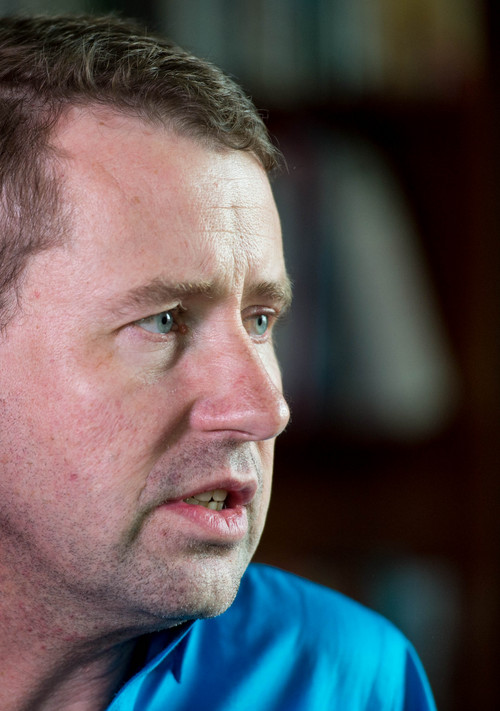This is an archived article that was published on sltrib.com in 2014, and information in the article may be outdated. It is provided only for personal research purposes and may not be reprinted.
The story begins with a sound. A ghostly, beautiful, mysterious sound.
Author and journalist Tom Zoellner is a boy visiting his grandmother on a rainy summer evening in a small Kansas town when the moan of a train whistle first beckons him.
"It seemed to me to be calling to a different sort of a world, a world that was still there but a world that we'd forgotten," he said.
This childhood impression blossomed into a lifelong fascination with trains that Zoellner acknowledges is both nostalgic and romantic. In that sense, it is not unlike the view many of us hold.
We love trains. We love their enormity, their speed and what they say about us as a nation of industry that embraces new technology.
Yet 98 percent of us have never even ridden on a passenger train in the United States.
"This is one of the thorns in the conscience of the United States. [Trains] built the country. The United States is impossible to imagine without the passenger train," Zoellner said. "Yet it has receded into our collective memory. We think of it as something that is important, that is charming — something that we would like to ride one day — yet it remains something of a ghostly presence in the American mind."
Thus begins Zoellner's case for bringing back the train, and he makes it exhaustively and eloquently in "Train: Riding the Rails That Created the Modern World, From the Trans-Siberian to the Southwest Chief" (Viking, $27.95).
The book is the April selection for Utah Lit, The Salt Lake Tribune's online book club. Jennifer Napier-Pearce will moderate a discussion about "Train" in a Trib Talk live video chat Friday, April 25, at 12:15 p.m. at sltrib.com.
"Train" has collected a number of positive reviews since its February release.
In the Los Angeles Times, Hector Tobar called the book a "highly entertaining, lucid and perceptive travelogue. … It's a train lover's celebration of the great epic story of rail travel itself."
In "Train," Zoellner, a former Salt Lake Tribune reporter and author of four other books, explores rail history and railroads' profound impact on the economy and society in general through distinct journeys across Great Britain, India, the United States, Russia, China, Peru and Spain.
Readers visit the birthplace of the locomotive in Great Britain, where, he writes, "the train was invented in fits and starts by several restless and talented people at the beginning of the nineteenth century who all happened to be working on the same problem — namely 'how can we keep water from seeping into our mine shafts?' "
"Out of this nuisance came a brilliant accident," Zoellner writes, "a new coal-fired vehicle of astonishing power that would kick-start the industrial revolution and change almost every aspect of modern living."
With Zoellner, readers travel from New Delhi to Varanasi, India, learning, alarmingly, of the enormous problem that rail system has with people defecating on the tracks, but also of how a vestige of British imperialism still employs thousands of people who collect salaries despite having next to nothing to do.
Riding the rails from Lima to Cerro de Pasco, Peru, Zoellner takes readers on a heart-stopping journey "upward in the Andes, at grades as high as 4.2 percent, among the steepest in the world, past terraced villages that clung to the rocky mountainsides." Despite the perilous nature of the journey, the experience yields what he calls "a central truth about the railroad: there remains no better mechanism for hauling heavy commodities," such as silver, zinc and bismuth mined in the Andes.
Similar truths about the railroad emerge from each journey Zoellner describes. So, too, do entertaining stories collected from those he meets along the way.
"A train is the perfect environment for conversation. There is space to get up and walk around," he writes. "The mechanistic ka-chunk, ka-chunk, ka-chunk of the motion has a soothing effect, unlike the sterile, narcotizing ahhh of a jetliner in flight."
That holds true even when you don't share a common language.
On Zoellner's 6,000-mile Trans-Siberian journey, he shares moonshine made of flowers and stale bread with two young men and they converse, with one of them asking a question in Russian and Zoellner answering in English and "we both nodded and laughed as if we understood," he writes. "We toasted Putin and then Obama and LeBron James and anybody else we could think of that we had in common."
In the end, after examining Spain's bold experiment with high-speed rail on a journey from Barcelona to Madrid, Zoellner argues the merits California may derive from such a project.
He does so knowing such a project may never happen but believes it should.
"There's no more beautiful kind of a vehicle, one that carries in its wake creativity, genius, brutality — kind of the whole human story," Zoellner said.
Sentimental? Certainly.
Now it's up to readers to decide whether his arguments overcome sentimentality to make a valid case.
Twitter: @lcarricaburu —
Three things you might not know about trains
The term "highball" can be used to describe a cocktail or to convey a need to get moving. It originated on the railroad from what author Tom Zoellner described as a "crude method of signaling developed before electricity where an actual wooden ball would be pulleyed up signaling the driver to move the train forward."
Today's traffic signals also have rail origins. "Green" for "go" was pioneered on the Liverpool and Manchester Railway in Great Britain in 1830.
Successful booksellers including W.H. Smith got their start selling to travelers who preferred to read rather than suffer the embarrassment of having to talk to strangers on British trains. In the early days, passengers were seated facing one another. —
Join us for a Trib Talk
Jennifer Napier-Pearce will moderate a Utah Lit discussion about "Train" on Friday, April 25, at 12:15 p.m. at sltrib.com.
You can join the discussion by asking questions or making comments using the hashtag #TribTalk on Twitter or Google+ or by calling 801-609-8059.









